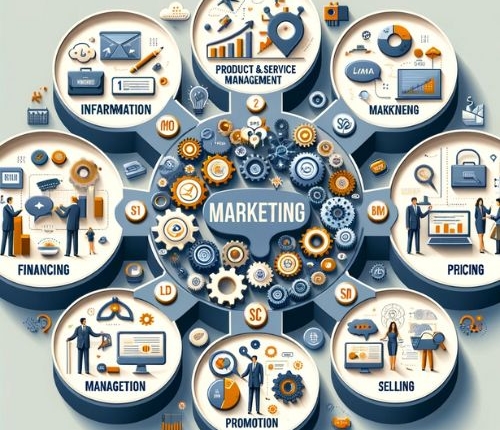Explore the 7 Functions of Marketing Mastery
Marketing is a critical component of any successful business strategy. To truly excel in this area, it’s imperative to understand and master the 7 functions of marketing. These functions represent key activities that businesses must engage in to promote and sell their products or services, and they are essential to building a strong brand, driving growth, and fostering customer loyalty.
In this article, we’ll take an in-depth look at each of the 7 functions of marketing, exploring what they are, how they work, and why they’re so important to your overall business strategy. Whether you’re a small startup or a large corporation, mastering these functions can make all the difference in achieving your goals and outpacing the competition.
Key Takeaways:
- Mastering the 7 functions of marketing is key to building a successful business strategy.
- These functions encompass a range of activities, from product planning and development to customer service.
- Understanding and implementing these functions can give your business a competitive edge and drive growth and customer loyalty.
- Effective marketing involves a comprehensive approach that takes into account all 7 functions.
- Whether you’re a startup or an established company, it’s never too late to optimize your marketing strategy with these key functions.
What are the Functions of Marketing?
Marketing functions are a range of activities that businesses undertake to promote their products or services. These functions are essential components of any successful marketing strategy. By understanding the functions of marketing, you can build a comprehensive plan to achieve your business goals.
There are seven distinct functions of marketing:
| Function | Description |
|---|---|
| Product Planning and Development | Identifying consumer needs, designing and developing products |
| Pricing | Determining the optimal price for your products or services |
| Promotion | Creating awareness and generating interest in your products or services |
| Distribution | Getting your products or services to the right customer at the right time |
| Selling | Persuading customers to make a purchase through sales techniques and customer relationship management |
| Market Research | Understanding consumer preferences, market trends, and competitive landscapes |
| Customer Service | Providing exceptional support and assistance to customers |
By mastering these functions, you can create a comprehensive marketing strategy that drives growth, builds a strong brand, and fosters customer loyalty. In the next sections, we will delve further into these seven functions and how they work together to achieve marketing mastery.

Function 1 – Product Planning and Development
Product planning and development is the foundation of an effective marketing strategy. By identifying consumer needs and preferences through thorough market research, businesses can create products that fulfill those needs and stand out from the competition. This function involves designing and developing products from scratch, or refining existing ones.
To ensure success in product planning and development, it is crucial to keep a close eye on industry trends, consumer demand, and emerging technologies. By staying up-to-date with advancements in these areas, businesses can create innovative products that meet customers’ evolving needs.
So, how can you master product planning and development?
- Conduct comprehensive market research to identify consumer needs and market trends.
- Design and develop products that meet those needs and stand out from the competition. Utilize feedback from focus groups, surveys, and other customer research to refine your product.
- Continuously monitor and evaluate emerging technologies, trends, and customer demand to identify areas for innovation and improvement.
| Question: | Objective: |
|---|---|
| What problems do you face when using similar products? | To identify areas for innovation and improvement. |
| What features do you wish these products had? | To identify potential areas for product development. |
| What are the most important factors you consider when purchasing this type of product? | To identify key selling points and value propositions for the product. |
By following these steps and taking the time to develop high-quality products that meet consumers’ needs, businesses can establish themselves as leaders in their industries and build strong brand reputations.
Function 2 – Pricing
Determining the right price for your products or services is a crucial part of your marketing strategy. Pricing directly affects your profitability and customer perception of your brand. When setting prices, consider various factors such as production costs, market demand, and competitor pricing. By finding the sweet spot between what customers are willing to pay and your profitability needs, you can maximize customer value and increase sales.
Factors to consider in pricing
- Production costs
- Market demand
- Competitor pricing
- Customer perception and willingness to pay
Pro tip: Consider conducting market research and testing different prices to find the optimal price point that both maximizes profitability and provides value for customers.
Function 3 – Promotion
Are you struggling to increase brand awareness and engage with your customers? Promotion is a key function of marketing that involves creating interest and driving sales of your products or services. Through various marketing activities such as advertising, public relations, sales promotions, and digital marketing, you can attract new customers and retain existing ones.
Effective promotion helps build brand recognition, establish credibility, and drive customer engagement. To achieve the desired results, you must identify your target audience and tailor your promotional activities to reach them in the most impactful way possible. By using a combination of marketing tactics, you can create a compelling message that resonates with your customers, leading to increased sales and business growth.
“Promotion is a way of making people aware of your product. If they don’t know your product, they can’t buy it.” – Anonymous
Make the most of your promotional activities by analyzing the results to identify what works and what doesn’t. This will help you optimize your efforts for maximum impact and improve your return on investment (ROI). By staying on top of current trends and adopting innovative promotional strategies, you can stay ahead of the competition and elevate your business to the next level.

Function 4 – Distribution
Efficient distribution is a critical function of marketing that ensures your products or services reach your customers wherever they are. By managing the supply chain, logistics and channels of distribution, you can streamline your business, reduce costs, and get your products to market faster. Focusing on customers’ needs, preferences, and locations can help refine the approach to distribution. This ensures that your business targets the right markets and demographics providing direct access and making it easier for customers to purchase your products or services.
The Importance of a Well-Planned Distribution Strategy
A well-planned distribution strategy can give your business a competitive edge and can positively contribute to your bottom line. By approaching distribution with a comprehensive strategy, businesses can improve customer satisfaction by providing timely delivery and minimizing shipping times, enhancing the overall customer experience. A well laid out distribution approach will result in your business being perceived as reliable and professional, creating brand loyalty and customer retention.
Without an effective distribution strategy, even the best product can remain hidden from consumers’ view.
Key Considerations for Developing an Effective Distribution Strategy
Developing an effective distribution strategy requires analysis of various factors, including customer demographics, market access, and customer demand. It is crucial for businesses to determine the best channels of distribution for their products or services to improve sales, while optimizing retention rates. Businesses can select channels such as e-commerce, retail, wholesale, franchising, direct sales, or a mixture of these options, depending on customer demand, market opportunity, and industry trends. Working with logistics partners can also help ensure timely delivery to customers while reducing your staffing and warehousing costs. A thorough analysis and effective implementation of a distribution strategy can optimize time, costs, and resources, leading to sustainable growth and success.
| Benefits of a well-planned distribution strategy | Key Considerations for distribution strategy |
|---|---|
| Easier market penetration | Customer demographics |
| Reduced delivery times and shipping costs | Market access |
| Improved customer satisfaction, resulting in customer loyalty and retention | Channels of distribution |
| Access to new customer segments, plant the seeds for growth planning | Logistics partners |
Properly executed distribution is a significant component to achieve successful marketing mastery. By employing a strategic approach to distribution, businesses can efficiently and effectively reach their target markets, nurture customers’ trust, and enhance brand loyalty. A comparison of actual performance and established objectives can enable a constant review of your distribution strategy, ensuring the continued success of your business.
Function 5 – Selling
If your business has a product or service, then selling is crucial. The selling function of marketing is responsible for convincing potential customers to make a purchase. Sales techniques, customer relationship management, and excellent customer service are integral components of successful selling. Effective selling techniques can drive revenue and build long-term customer loyalty.
One critical aspect of successful selling is identifying your target audience. Understanding their needs, interests, and preferences, you can create a tailored message that resonates with them. This can lead to higher conversion rates and increased sales.
It’s essential to provide excellent customer service throughout the sales process. By building a positive relationship with customers, you can foster loyalty and retention. Additionally, unhappy customers can damage your brand’s reputation. By addressing their concerns and resolving complaints promptly, you can prevent negative word-of-mouth and protect your image.
Examples of Effective Selling Strategies
| Strategy | Description |
|---|---|
| Persuasive Communication | Using persuasive language and communication techniques to convince customers to make a purchase. |
| Sales Promotions | Offering discounts, free samples, or other promotions to incentivize customers to buy. |
| Upselling and Cross-Selling | Encouraging customers to buy more or additional products or services. |
| Relationship Building | Building strong relationships with customers over time to foster loyalty and retention. |
Effective selling is critical to the success of any business. By understanding your target audience, developing persuasive communication strategies, and providing excellent customer service, you can drive revenue and build long-term customer loyalty.
Function 6 – Market Research
In today’s fast-paced business environment, market research is a vital component of any strategic marketing plan. By conducting market research, businesses can gather valuable insights that inform decision-making, guide product development, and enable them to adapt their marketing strategies to stay ahead of changing customer demands.
Market research involves a range of activities, including:
- Collecting and analyzing data on consumer preferences, behaviors, and needs
- Monitoring market trends and identifying emerging opportunities and threats
- Evaluating the effectiveness of marketing campaigns and sales strategies
- Assessing customer satisfaction and loyalty
The results of market research can help businesses make informed decisions about product pricing, distribution, and promotion, and identify gaps or opportunities in the market that can be leveraged to gain a competitive advantage.
Market research can be conducted through a variety of methods, including surveys, focus groups, and online research. By leveraging these tools and techniques, businesses can gain meaningful insights into the preferences and behaviors of their target audience, and use this information to refine their marketing strategies and drive growth.
Function 7 – Customer Service
Exceptional customer service is key to building customer loyalty and retention. It encompasses a wide range of activities, from answering customer inquiries to addressing and resolving complaints promptly.
Providing helpful, courteous, and professional service can earn you repeat business and positive word-of-mouth promotions. Research shows that customers are more likely to return to businesses that provide excellent service and recommend them to others. Therefore, it is essential to prioritize customer service as part of your marketing strategy.
Make sure to train your team to provide top-notch customer service and establish a system for tracking customer satisfaction. Listen to your customers’ feedback, assess their needs, and address any issues promptly. Remember that a happy customer is a repeat customer, and your business depends on it.

Importance of Mastering the 7 Functions of Marketing
Are you struggling to gain a foothold in today’s competitive marketplace? Mastering the 7 functions of marketing can be the key to your success. These functions are critical components that drive growth, develop a strong brand image, and cultivate customer loyalty. Understanding and effectively implementing these functions will help you create a comprehensive marketing strategy that leads to long-term success.
Product planning and development is the first function of marketing and plays a crucial role in laying the groundwork for a successful marketing strategy. Pricing, promotion, distribution, selling, market research, and customer service are the other six functions that shape your marketing strategy and drive revenue.
By mastering these functions, you can determine the optimal price for your products or services, create awareness and generate interest, deliver products or services efficiently, persuade customers to buy, gather valuable insights, and provide exceptional support and assistance to customers.
When you incorporate the 7 functions of marketing into your business strategy, you can differentiate your business from competitors, boost brand recognition, and foster customer loyalty and trust. By continuously optimizing these functions, you can ensure that your marketing efforts are always up-to-date and aligned with consumer preferences and market trends.
Elevate Your Business Strategy with the 7 Functions of Marketing
Now that you have a solid understanding of the 7 functions of marketing, it’s time to put that knowledge into action. By mastering these functions, you can elevate your business strategy and make significant strides towards achieving your goals.
One of the biggest advantages of incorporating these functions into your strategy is the ability to create a comprehensive marketing plan that covers all aspects of your business. From product development to customer service, each function plays a crucial role in the success of your marketing efforts.
By leveraging these functions, you’ll be able to differentiate yourself from competitors and build a strong brand that resonates with your target audience. You’ll also be better equipped to identify and capitalize on new opportunities as they arise, ensuring that you stay ahead of the curve in a rapidly evolving market.
Don’t underestimate the power of mastering the 7 functions of marketing. By doing so, you’ll be positioning your business for long-term success and growth. So what are you waiting for? Start implementing these functions into your strategy today and watch your business soar to new heights!
FAQ
What are the functions of marketing?
The functions of marketing encompass a range of activities that businesses engage in to promote their products or services. These functions include product planning and development, pricing, promotion, distribution, selling, market research, and customer service.
What is product planning and development?
Product planning and development is the first function of marketing. It involves identifying consumer needs and preferences, conducting market research, and designing and developing products that meet those needs.
Why is pricing important in marketing?
Pricing is an important function of marketing that involves determining the optimal price for your products or services. Factors such as production costs, competition, and customer perception are taken into account to set the price that maximizes profitability and value for customers.
What is promotion in marketing?
Promotion is all about creating awareness and generating interest in your products or services. This function encompasses various marketing activities such as advertising, public relations, sales promotions, and digital marketing.
What is the function of distribution in marketing?
Distribution focuses on getting your products or services to the right customer at the right time. This function involves managing supply chains, logistics, and channels of distribution to ensure efficient delivery and customer satisfaction.
What is selling in marketing?
Selling is the function of marketing that focuses on persuading customers to make a purchase. It involves the development of sales techniques, customer relationship management, and providing excellent customer service.
Why is market research important in marketing?
Market research plays a crucial role in understanding consumer preferences, market trends, and competitive landscapes. Through market research, businesses can gather valuable insights that inform decision-making and enable them to adapt their marketing strategies to meet changing customer demands.
What is the role of customer service in marketing?
Customer service is an integral function of marketing that focuses on providing exceptional support and assistance to customers. It involves addressing customer inquiries, resolving complaints, and building strong relationships that foster customer loyalty and retention.
Why is it important to master the 7 functions of marketing?
Mastering the 7 functions of marketing is essential for any business that wants to succeed in today’s competitive marketplace. By understanding and effectively implementing these functions, businesses can create a comprehensive marketing strategy that drives growth, builds a strong brand, and fosters customer loyalty.
How can I elevate my business strategy with the 7 functions of marketing?
Incorporating the 7 functions of marketing into your business strategy can make a significant difference in achieving your goals. Whether you’re a small startup or an established company, understanding and optimizing these functions will give you a competitive edge and position your business for long-term success.



